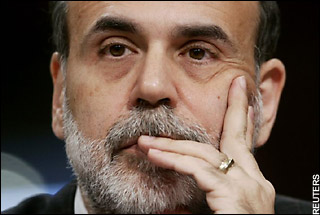. : About me : .
Name::Trade Monkey
From::Middlebury, Connecticut, United States
Email Me!
View my profile
. : Recent Posts : .
Lack of Posting
Headline of the Day
Power Law in FX Trading
How Not to Respond to High Gas Prices
VC Firms Bet on Clean Energy Deals
Alternative-Fuel-O-Rama:
Regulatory Arbitrage in Exchanges
Boston Leads in Hedge Funds - Not!!
StateMaster
Neuro-economics
. : Archives : .
February 2006
March 2006
April 2006
May 2006
June 2006
. : Tools : .
. : Fin/Econ Links : .
. : Misc Links : .
Atlas Shrugs
Belmont Club
Cato Institute
Foreign Dispatches
Instapundit
Kim Du Toit
MIT OpenCourseware
Oxblog
Protein Wisdom
Samizdata
Templates By Caz
TCS Daily
Truth on the Market
Volokh Conspiracy
**View my Wish List**
. : Credits : .
Template By Caz
Powered by: Blogger
Saturday, May 20, 2006
Fed Chief Wary of Regulating Hedge Funds I came across this article (in of all places the Rocky Mountain News) regarding the new fed chief’s position on the regulation of hedge funds.
I came across this article (in of all places the Rocky Mountain News) regarding the new fed chief’s position on the regulation of hedge funds.Federal Reserve Chairman Ben S. Bernanke, who pledged to continue the policies of his predecessor, is sticking close to Alan Greenspan's opposition to regulation of hedge funds. Bernanke on Tuesday told a hedge-fund conference hosted by the Atlanta Fed that he's skeptical about proposals such as a database of fund holdings that would let authorities monitor risk in the broader financial system. Instead, firms that deal with hedge funds are best equipped to do the job because they have the "best incentives."
The Bloomberg reporters, Craig Torres and Scott Lanman, go on to further note:
His comments may not be the last word on the $1.2 trillion industry because the Fed doesn't have direct jurisdiction over financial markets. That's the responsibility of the Securities and Exchange Commission, whose former chairman, William Donaldson, clashed with Greenspan over a rule to require hedge funds to register with the agency.
I know, not exactly ground-breaking news, but it does reveal the fed chief's position on overall regulation.
Being the SEC has regulatory authority over the hedge fund industry, their historic position of "if it's not broke don’t fix it" will prevail - that is until the next hedge fund scandal causes a political clamor. Then, opportunistic politicians and various other demagogues will bend the SEC to their will and force hedge funds to a level of greater accountability. But I think it will take a financial catastrophe, on the scale of a LTCM, to motivate the Washington and the SEC (wary from the troubles of Sarbanes- Oxley) to increase regulation.
Two other points to consider: 1) would greater regulation of the industry attract even more capital to hedge funds? After all, more traditional asset managers, especially pension funds, would be more willing to have hedge funds manage money on their behalf if the industry had a higher level of transparency. 2) If the industry becomes more regulated, would smaller investors still be shut out?
The potential flood of new money into hedge funds would more than make up for the increased costs of compliance associated with any new regulatory initiative. However, this flood of money would pose an even greater challenge to hedge funds.